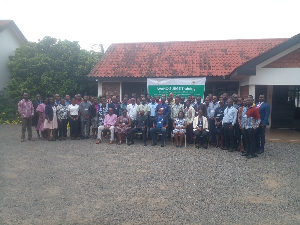 Participants in a group photo after the opening ceremony
Participants in a group photo after the opening ceremony
A team of experts drawn from various institutions is receiving intensive training on health emergency response in Ho, the Volta regional capital.
It is a five-day training dubbed AVoHC-SURGE training. The entire training is in 4 modules and will be done within 4 weeks.
The trainees were randomly selected from the country's health sector, including energy, the Environmental Protection Agency (EPA), the Food and Drugs Authority, hospitals, district assemblies, and municipal assemblies, including medical practitioners.
The training is to enhance their capacity to respond to emergency health situations in the country and also extend their knowledge to cover the entire region.
In Ghana, some emergency health situations are the COVID-19 pandemic, malaria, yellow fever, the Akosombo Dam spillage disaster in the lower Volta, the Appiatse explosion, and the recent dengue fever outbreak.
Speaking at the opening ceremony on Monday, July 29, 2024, Dr. Argata Guracha GUYO, Country Emergency Preparedness/IHR Officer, delivered a speech on behalf of Dr. Frank Lule, Officer in Charge of the World Health Organization (WHO) Ghana.
According to Dr. Frank, the training is necessary because "we recognize that the complexity and frequency of health emergencies are increasing. Therefore, we must equip ourselves with the necessary skills, knowledge, and coordination to respond swiftly and effectively."
He further said, "The Africa CDC and WHO have collaborated to implement AVoHC-SURGE trainings aimed at ensuring that African countries are prepared to respond to health emergencies and humanitarian crises within 24 to 48 hours from the time of incident, and Ghana is among the over 20 countries benefiting from the training so far."
"I am confident that this training will equip us with the skills and knowledge necessary to tackle health emergencies effectively. Together, we can make a significant difference in safeguarding the health and well-being of our communities," he added.
According to research, the world records about one hundred emergency health cases annually, and about 70 percent come from Africa.
On his part, the Director of the Public Health Division of the Ghana Health Service, Dr. Franklin Asiedu-Bekoe, came up with the idea to combat the menace some two years ago in Botswana.
He said, "We've gathered here these fifty persons, and they'll be trained in the areas of surveillance and emergency management so that if any event should occur in Ghana, they will be the key point of contact, and if there's any big issue in other countries, they can be recruited."
The Ghana Health Service partnered with WHO, Canada, and other international organizations for the initiative.